Photographs: Akhtar Soomro/Reuters Amir Mir in Islamabad
The findings of a recent US report indicate how deeply ingrained hard-line Islam is in Pakistan and help explain why militancy is often supported, tolerated or excused in the country, writes noted Pakistani journalist Amir Mir.
A recent study report by the United States Commission on International Religious Freedom has researched the Pakistani school textbooks to discover how the ruling regimes attempt to construct nationhood in the young minds and how textbooks are misused as an instrument of ruling paradigms to develop a particular anti-Hindu and anti-India mind set.
Funded by the USCIRF, the 139-page study report was prepared by the International Center for Religion and Diplomacy in partnership with a Pakistani think tank, the Sustainable Development Policy Institute.
The report was released in Washington on November 9.
After poring through more than 100 textbooks from grades 1 to 10 across all four provinces; visiting 37 public schools and interviewing 277 students and teachers; visiting 19 madrassas and interviewing 226 students and teachers, the US commission members discovered that there is religious bias in Pakistani textbooks which teaches bigotry against the minority communities of the country.
The USCIRF study report shows how education can be distorted to construct a particular kind of national chauvinism and a mind set and how ruling regimes intervene in education to promote certain ideologies that suits their own interests.
Please ...
'Pak textbooks promote intolerant views towards non-Muslim minorities'
Image: Pakistani Christians carry a cross through the streets of Quetta while observing Good FridayPhotographs: Naseer Ahmed/Reuters
Textbooks are the obvious examples of how history is manipulated, especially if it is conceived by ruling regimes and authored by people with interest in constructing a nation based on a homogeneous nationality.
The USCIRF, an independent, statutory body which advises the US government on religious freedom around the world, has called every year since 2002 for the US State Department to designate Pakistan as a "country of particular concern", but to no avail.
"The goal of the 2011 USCIRF study was to explore what linkages, if any, exist between the portrayal of religious minorities in Pakistan's public schools and madrassas, biases that exist toward these minorities, and acts of discrimination or extremism resulting from such biases," Leonard Leo has written in the preface to the study report. The results of the study, according to him, were "eye opening and concerning."
The commission members unanimously observed that teaching discrimination increases the likelihood that violent religious extremism in Pakistan will continue to grow in time to come, weakening religious freedom, national and regional stability, and global security.
"Textbooks being used in Pakistani public schools and madrassas promote intolerant views of non-Muslim minorities, extol jihad, and portray non-Muslims not at citizens with rights but as infidels, pagans, apostates or subservient dhimmis", says the study report.
Interviews with teachers and students, carried out as part of the investigation, found that negative views of non-Muslims contained in the textbooks are widely held by teachers and transmitted to children.
'Anti-Islamic forces are always trying to finish the Islamic domination of the world'
Image: A teacher guides students in reciting verses from the Holy Koran at a mosque in Peshawar.Photographs: Fayaz Aziz/Reuters
"The commission's study documents how Pakistan's public schools and privately-run madrassas are not teaching tolerance but are exacerbating religious differences," said the USCIRF chairman Leonard Leo while releasing the report.
The findings indicate how deeply ingrained hardline Islam is in Pakistan and help explain why militancy is often supported, tolerated or excused in the country.
Pakistan was created in 1947 as a homeland for the Muslims of South Asia and was initially envisaged as a moderate state where minorities would have full rights.
But three wars with mostly 'Hindu' India; support for militants fighting Soviet-rule in Afghanistan in the 1980s; and the appeasement of hard-line clerics by weak governments seeking legitimacy have led to a steady radicalisation of society.
Religious minorities and those brave enough to speak out against intolerance have often been killed, seemingly with impunity, by militant sympathisers.
According to the findings of the commission, despite efforts by Pakistani authorities to reform the education system over the past six years, including revisions to the national curricula, the problematic content remains in textbooks, including those that have been reprinted since the revisions were introduced.
Even ostensibly non-religious textbooks contain significant Islamic content, and they are used by Muslim and non-Muslim children alike.
For example, in grade 3, 4, 5 and 6, Urdu-language social studies textbooks used in all the four provinces, lessons with Islamic content comprise about one-quarter of the total.
The study found that in the textbooks, the defence of Pakistan is equated with the defence of Islam. "The anti-Islamic forces are always trying to finish the Islamic domination of the world," reads an excerpt from a social studies textbook of grade 5.
"This can cause danger for the very existence of Islam. Today, the defence of Pakistan and Islam is very much in need. Where references to non-Muslims or non-Islamic beliefs do appear, they are often derogatory," the report states.
'Hindu culture is portrayed as unjust and cruel'
Image: Pakistani Hindu devotees dance to drum beats to praise Shri Hinglaj Mata in Balochistan provincePhotographs: Akhtar Soomro/Reuters
"Religious minorities are often portrayed as inferior or second-class citizens who have been granted limited rights and privileges by generous Pakistani Muslims, for which they should be grateful, and to whom religious minorities should be subservient," the report states.
"The contributions of religious minorities towards the formation, development, and protection of Pakistan are largely absent."
Hindus are often singled out, as are Ahmadis, adherents of an Islamic sect considered heretical by mainstream Muslims.
"Although an unbiased review of history would show that Hindus and Muslims enjoyed centuries of harmonious co-existence, Hindus are repeatedly described as extremists and eternal enemies of Islam. Hindu culture and society are portrayed as unjust and cruel, while Islam is portrayed as just and peaceful."
The few references to Christians "seem generally negative, painting an incomplete picture of the largest religious minority in Pakistan," while Jews are depicted as predatory moneylenders.
The USCIRF report acknowledged that many public school teachers and students do "advocate respect for religious minorities, but a large portion does not understand minority citizenship rights and are wary about them ever holding public office."
'Concept of jihad has been reduced to violent conflict'
Image: A Pakistani boy learns how to read English at a school on the outskirts of QuettaPhotographs: Naseer Ahmed/Reuters
Books used in madrassas, privately-run religious institutions, were especially worrying. The study report observed: "In every madrassa textbook reviewed, the concept of jihad has been reduced from its wider meaning of personal development to violent conflict in the name of Islam, considered to be the duty of every Muslim. The Quranic verse commanding the believer to 'kill the pagans (or infidels or unbelievers) wherever you find them' is often cited with no context."
"At no time is it suggested that decisions regarding warfare should be left to the state, creating the possibility that the reader could consider it his or her individual responsibility to fight," the report adds.
A previous study into the Pakistani school textbooks, which was conducted by the Brookings Institute in June 2010, had concluded that the real cause of militancy in Pakistan is the public education system and not madrassas or religious schools because the majority of Pakistani students attend public school whereas only ten per cent attend madrassas.
The report observed that the textbooks being taught at Pakistani public schools disseminate militancy, hatred and jihad and distort history.
Pakistan's ambassador to the United States Hussain Haqqani has expressed similar views in his book "Pakistan: between mosque and the military" (published by Carnegie Endowment for International Peace):
"Only officially published textbooks are used in Pakistani schools and colleges since the era of General Ayub Khan. This is used by the Pakistani government to create a standard narrative of Pakistan's history. During the rule of General Muhammad Zia-ul-Haq a program of Islamization of the country including the textbooks was started."
"General Zia's 1979 education policy stated that the highest priority would be given to the revision of the curricula with a view to reorganising the entire content around Islamic thought and giving education an ideological orientation so that Islamic ideology permeates the thinking of the younger generation and helps them with the necessary conviction and ability to refashion society according to Islamic tenets," Haqqani wrote.
In a 1995 paper published in International Journal of Middle East Studies historian Ayesha Jalal stated: "Pakistan's history textbooks are amongst the best available sources for assessing the nexus between power and bigotry in creative imaginings of a national past."
She pointed out authors whose expansive pan-Islamic imaginings detect the beginnings of Pakistan in the birth of Islam on the Arabian Peninsula.
Pakistan's 'hate literature'
Image: A young girl reads aloud while attending class in a makeshift school tent in MingoraPhotographs: Faisal Mahmood/Reuters
A textbook of Pakistan Studies claims that Pakistan "came to be established for the first time when the Arabs under Mohammad bin Qasim occupied Sindh and Multan'; by the thirteenth century 'Pakistan had spread to include the whole of Northern India and Bengal' and then under the Khiljis, Pakistan moved further south-ward to include a greater part of Central India and the Deccan'. The spirit of Pakistan asserted itself', and under Aurangzeb Alamgir, the 'Pakistan spirit gathered in strength'; his death 'weakened the Pakistan spirit'."
To tell the truth, the systematic slanting of the state prescribed curricula for all levels of the public education system in Pakistan was exposed in great detail by a comprehensive study report published by the Islamabad-based Sustainable Development Policy Institute way back in 2002.
Titled "The Subtle Subversion: The State of Curricula and Textbooks in Pakistan" and jointly written by A H Nayyar and Ahmed Salim, the report concluded that the Pakistani textbooks that form part of the present public school curriculum are lessons in bigotry, hate and a gross misrepresentation of history.
It added that the curriculum wing of the Pakistani federal ministry of education has somehow become the principal source of what can only be termed as 'hate literature'.
Giving instances, the SDPI report mentioned a 2002 directive from the Education Ministry's Curriculum Wing for the subject of Pakistan Studies, defining the following learning objectives: "Develop understanding of Hindu-Muslim differences and need for Pakistan (Class IV); Hindu-Muslim differences in culture, India's evil designs against Pakistan; identify the events in relation to Hindu-Muslim differences.
The study report, which was a close analysis of national curricula and textbooks by a group of independent Pakistani scholars, showed that for over two decades the national curricula and the officially mandated textbooks in the subjects of Social Studies, English, Urdu and Civics from Class I to Class XII have contained material that is directly contrary to the goals and values of a progressive, moderate and democratic Pakistan and encourage students to take part in jihad and martyrdom.
The report was abundantly clear on where the responsibility for these persistent distortions lies: "Over the years, it became apparent that it was in the interest of both the military and the theocrat to promote militarism in the Pakistani society. This confluence of interests now gets reflected in the educational material," the report added.
The SDPI study made it clear that that it is not just some deeni madrassas or religious seminaries that are spreading hatred, sectarianism and religious bigotry, but also the prescribed textbooks of the government-run schools.
'All textbooks being taught in Pak schools should be burnt'
Image: Girls react to their picture being taken from the doorway of a classroom while attending school in Mingora, PakistanPhotographs: Faisal Mahmood/Reuters
As a matter of fact, the concepts of jihad and martyrdom were incorporated into the Pakistani curriculum after the start of the so-called Afghan jihad against the Soviet occupation troops.
At that point, it suited Washington and its most allied of allies, Pakistan, to encourage and glorify the so-called mujahideen, or holy warriors, in the war against the Russians -- and an American institution of higher education was asked to formulate textbooks for Pakistani schools accordingly.
The University of Nebraska at Omaha, which has a centre for Afghan Studies, was subsequently tasked by the US Central Intelligence Agency in the early eighties to rewrite textbooks for Afghan refugee children.
The new textbooks included hate material even in arithmetic. For example, if a man has five bullets and two go into the heads of Russian soldiers, how many are left, kind of stuff.
This was exposed in a research thesis from the New School, New York in 2002. Since the Soviet forces withdrew from Afghanistan, the mujahideen not only mutated into Taliban but also outlived their usefulness; the same American University of Nebraska at Omaha was given an additional grant by the Bush administration in 2003 to re-write textbooks, taking out material on jihad, etc.
Pakistan is doing its utmost to meet the needs of changing times and to become a state geared up to cope with internal and external challenges and the most vital sector that can help achieve this goal is none other than education.
For most of the stuff that is now being taught in our educational institutions has long become outdated and outmoded, and this makes the need all the more urgent for new textbooks and other educational material, in line with the requirements of the modern world.
Therefore, a massive revision of the school and college syllabi is a must. All textbooks being taught in our schools should be burnt and objective scholars with a well-rounded worldview assigned to rewrite and recast the entire educational curriculum in both schools and colleges, mainly because Pakistani children need to learn about their society in the larger context of other societies of the world in an age of globalisation.

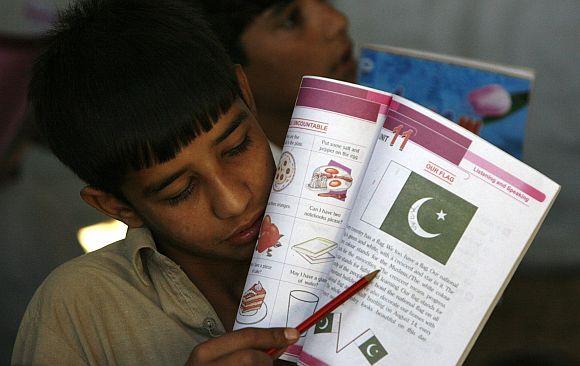
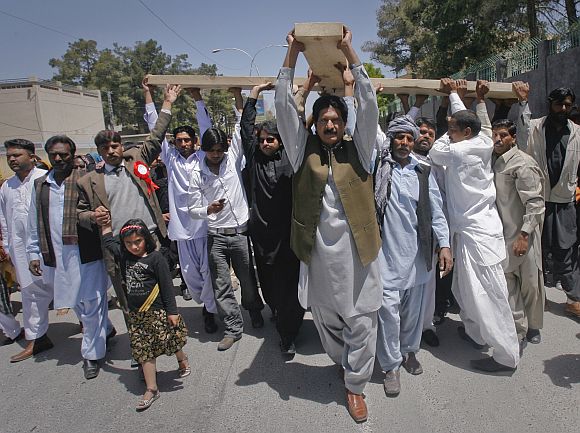
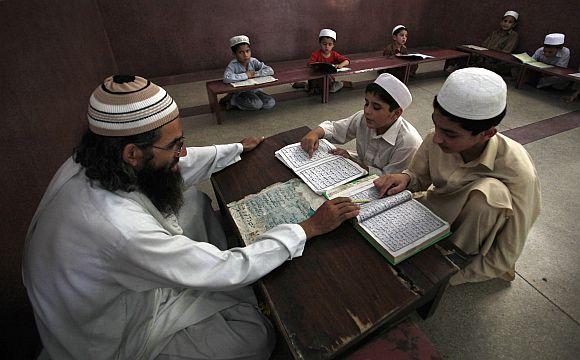
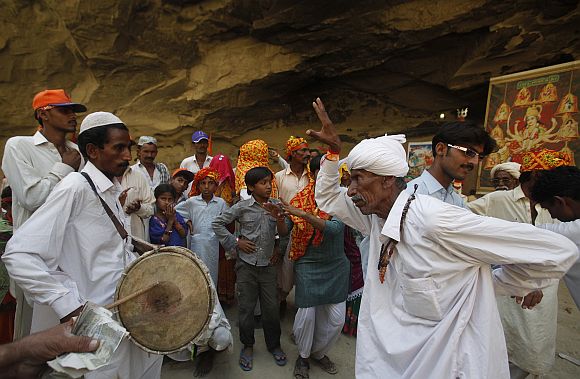
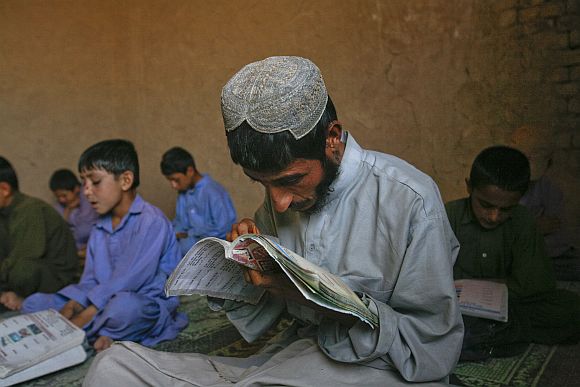


article